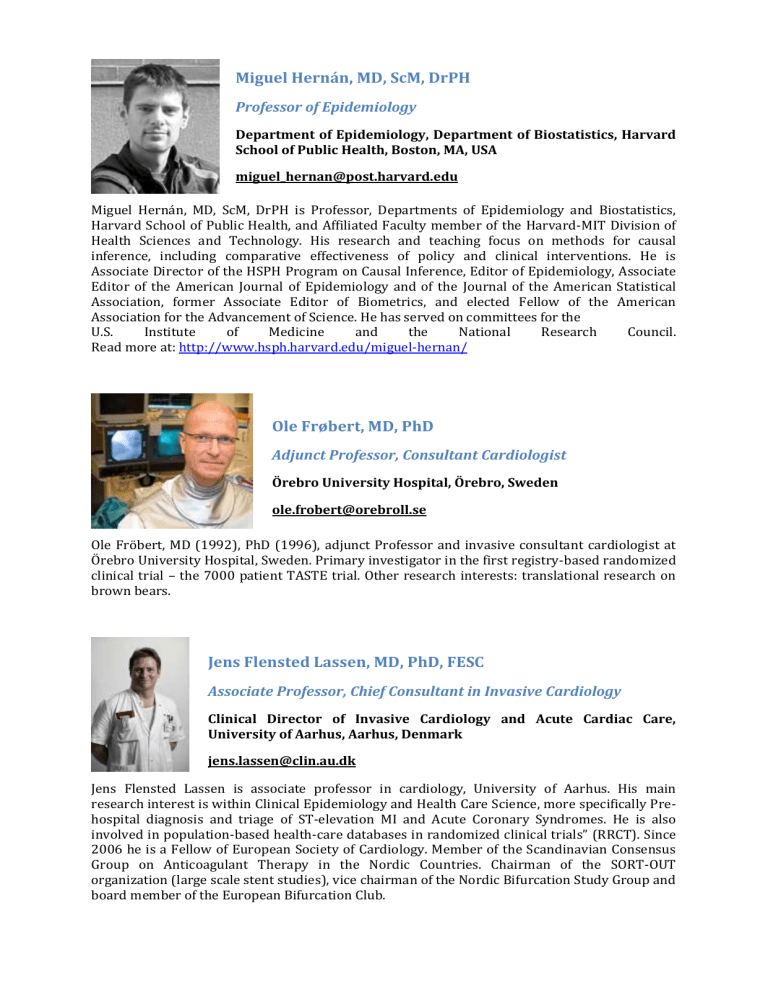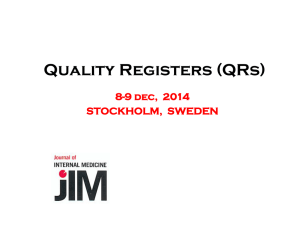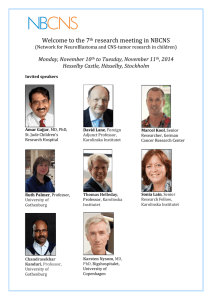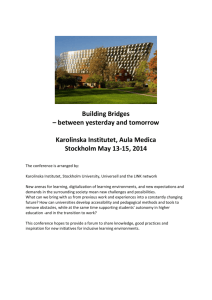teachers_biography_18_dec_141210
advertisement

Miguel Hernán, MD, ScM, DrPH Professor of Epidemiology Department of Epidemiology, Department of Biostatistics, Harvard School of Public Health, Boston, MA, USA miguel_hernan@post.harvard.edu Miguel Hernán, MD, ScM, DrPH is Professor, Departments of Epidemiology and Biostatistics, Harvard School of Public Health, and Affiliated Faculty member of the Harvard-MIT Division of Health Sciences and Technology. His research and teaching focus on methods for causal inference, including comparative effectiveness of policy and clinical interventions. He is Associate Director of the HSPH Program on Causal Inference, Editor of Epidemiology, Associate Editor of the American Journal of Epidemiology and of the Journal of the American Statistical Association, former Associate Editor of Biometrics, and elected Fellow of the American Association for the Advancement of Science. He has served on committees for the U.S. Institute of Medicine and the National Research Council. Read more at: http://www.hsph.harvard.edu/miguel-hernan/ Ole Frøbert, MD, PhD Adjunct Professor, Consultant Cardiologist Örebro University Hospital, Örebro, Sweden ole.frobert@orebroll.se Ole Fröbert, MD (1992), PhD (1996), adjunct Professor and invasive consultant cardiologist at Örebro University Hospital, Sweden. Primary investigator in the first registry-based randomized clinical trial – the 7000 patient TASTE trial. Other research interests: translational research on brown bears. Jens Flensted Lassen, MD, PhD, FESC Associate Professor, Chief Consultant in Invasive Cardiology Clinical Director of Invasive Cardiology and Acute Cardiac Care, University of Aarhus, Aarhus, Denmark jens.lassen@clin.au.dk Jens Flensted Lassen is associate professor in cardiology, University of Aarhus. His main research interest is within Clinical Epidemiology and Health Care Science, more specifically Prehospital diagnosis and triage of ST-elevation MI and Acute Coronary Syndromes. He is also involved in population-based health-care databases in randomized clinical trials” (RRCT). Since 2006 he is a Fellow of European Society of Cardiology. Member of the Scandinavian Consensus Group on Anticoagulant Therapy in the Nordic Countries. Chairman of the SORT-OUT organization (large scale stent studies), vice chairman of the Nordic Bifurcation Study Group and board member of the European Bifurcation Club. Claus-Göran Hjelm IT manager Statistics Sweden, Stockholm, Sweden claus-goran.hjelm@scb.se C-G Hjelm works at Statistics Sweden. After technical university and studies in system science he worked as IT director at the university in Örebro. In the beginning of the 90'th he build and developed information systems for public service and transportation in both own companies and as employed. From 1995 - 2002 he was a consultant director at Sema Group with responsibility for primary new technics and resource management all over Scandinavia. From 2002 he works for Statistics Sweden and started as a IT manager, has initiated and started up the register coordination and microdata access and have worked most of the time with research and development. Magnus Stenbeck, PhD Associate Professor Division of Insurance Medicine, Department of Clinical Neuroscience, Karolinska Institutet, Stockholm, Sweden magnus.stenbeck@ki.se Previously responsible for register based social and epidemiological research at the Center for Epidemiology (EpC), National Board of Health and Welfare. Since 2007 engaged in building a national data infrastructure for research. In this role, among other things as former Director of the Database Infrastructure Committee (Swedish Research Council), and as secretary and expert in the Bengt Westerberg 2012 and 2014 government enquiries on register based research. Research areas include social survey measurement, the social consequences of illness, and cancer epidemiology. Juho Härkönen, PhD Associate Professor Department of Sociology, Stockholm University, Stockholm, Sweden juho.harkonen@sociology.su.se Juho Härkönen is an Associate Professor of sociology at Stockholm University. His research and teaching activities involve developments of social inequalities across the life course, and particularly the interactions between families and inequalities in education and the labor market. Read more at: http://people.su.se/~jhr/ Kirk Scott, PhD Professor of Economic History Centre for Economic Demography & Dept. of Economic History, Lund University, Lund, Sweden Stockholm University Demography Unit, Stockholm University, Stockholm, Sweden Institute for Futures Studies, Stockholm, Sweden kirk.scott@ekh.lu.se Kirk Scott is professor of Economic History at Lund University, Sweden. His research lies primarily in the intersection between immigrant integration and demography, with focuses on labor market integration in general, and its impact on demographic behavior in particular. To this end, interest has been both on the economic and demographic integration of immigrants themselves, as well as the pathways through which the children of immigrants integrate into the host society. Parallel with these studies, Scott has become increasingly interested in the economic impacts of population ageing, and potential policy answers to the challenges caused by an ageing population. Scott is a past president of the Swedish Demographic Association and the Nordic Demographic Association, and served as Dean of the European Doctoral School of Demography 2009 – 2011. Mårten Lundberg Senior Consultant Hero Communications, Stockholm, Sweden marten@herokommunikation.se Mårten Lundberg has over 20 years of experience in communication work and has worked with Sweden’s most well-known companies and organizations, both in public and private sector. He has developed award winnings campaigns for well-known brands and is a jury member for several communication awards and prizes. Mårten Lundberg also has a background in health care and worked as an Editor-in-Chief at Karolinska Hospital and Sveriges Kommuner och Landsting (SKL). Marten holds a Bachelor of Arts in Communication Science. Louise Emilsson, MD, PhD Researcher Resident at general practice at Vårdcentralen Värmlands Nysäter , Nysäter Sweden lojsankik@hotmail.com Louise Emilsson received her M.D. at Karolinska Institutet in 2008 and subsequently performed her internship at Arvika hospital. She defended her thesis “Cardiac Complications in Celiac Disease” 2013 under supervision of Professor Jonas F Ludvigsson. She is currently working as a resident in general practice at Vårdcentralen Värmlands Nysäter, along with part-time positions as senior lecturer at Örebro University School of Health and Medical Science and as a postdoc at Institute of Health and Science, University of Oslo. She has recently published a “Review of 103 Swedish Healthcare Quality Registries” in Journal of Internal Medicine together with Bertil Lindahl, Max Köster, Mats Lambe and Jonas F Ludvigsson. Jonas Ludvigsson, MD, PhD Professor of Clinical Epidemiology, Senior Physician Department of Medical Epidemiology and Biostatistics, Karolinska Institutet, Stockholm, Sweden Department of Paediatrics, Örebro University Hospital, Örebro, Sweden Jonas.Ludvigsson@ki.se Jonas Ludvigsson combines a successful career as a researcher with his practice as a paediatrician. His main research interest is gastroenterology and pregnancy-childhood epidemiology. In 2012-14 he was the chairman of the Swedish Society of Epidemiology, and currently serves as the chairman of the Swedish Society of Paediatrics. He is the author of the Swedish book “Att börja forska inom medicin” [How to do medical research], and recently published a book about his experiences as Fulbright Research Scholar at the Mayo clinic. Ludvigsson also blogs about paediatric topics: http://www.barnlakarforeningen.se/nyheter/ Read more at: http://ki.se/en/people/joludv Jesper Lagergren, MD, PhD Professor of Surgery Department of Molecular Medicine and Surgery, Karolinska Institutet, Stockholm, Sweden Jesper.Lagergren@ki.se Jesper Lagergren is academic surgeon with a focus on oesophageal cancer in both research and clinical activities. He holds two full tenured professorships, one at Karolinska Institutet in Stockholm and one at King's College London. He leads research groups in each of these universities. His research focuses on the causes, prevention and treatment of oesophageal cancer and conditions associated with this tumor, i.e. Barrett's oesophagus, gastro-oesophageal reflux and obesity. Coordinates the SIMSAM Node for Upper Gastrointestinal Research, as part of the Swedish Initiative for research on Microdata in the Social and Medical Sciences (SIMSAM). Read more at http://ki.se/en/mmk/upper-gi-surgery. Robert Erikson, PhD Professor of Sociology Swedish Institute for Social Research, Stockholm University, Stockholm, Sweden robert.erikson@sofi.su.se Robert Erikson is Professor at the Swedish Institute for Social Research, Stockholm University. His research interests concern social stratification, education, family, and health, especially the study of individual change over the life course and how it can be understood with regard to individual and structural conditions. His publications have foremost been in the fields of social stratification and mobility, educational attainment, and individual well-being. Professor Erikson is member of the International Scientific Advisory Committee, Swedish Initiative for Research on Microdata in the Social and Medical Sciences (SIMSAM), Read more at: http://www2.sofi.su.se/~roer/. Irma Elo, PhD Professor of Sociology, Adjunct Professor of Demography Department of Sociology & Population Studies Center, University of Pennsylvania, Philadelphia, USA University of Helsinki, Helsinki, Finland popelo@pop.upenn.edu Irma Elo is Professor of Sociology at the Department of Sociology & Population Studies Center, University of Pennsylvania and Adjunct Professor of Demography, University of Helsinki. Her research interests concern what accounts for race/ethnic and socioeconomic differences in health and mortality, especially what factors that underlie them? Her research focuses on how societal inequalities affect these health disparities across the life course, including possible effects of early life conditions and neighborhood context. Member, International Scientific Advisory Committee, Swedish Initiative for Research on Microdata in the Social and Medical Sciences, Read more at: http://sociology.sas.upenn.edu/irma_elo. Elsebeth Lynge, PhD Professor of Epidemiology Center of Epidemiology and Screening, Department of Public Health, University of Copenhagen, Copenhagen, Denmark elsebeth@sund.ku.dk Elsebeth Lynge is Professor of Epidemiology at the University of Copenhagen since 1998. She heads a research centre for evaluation of screening for cancer diseases. Before this, she was head of the research unit at the Danish Cancer Society. She initiated register-based research on workrelated cancer in Denmark, and she contributed to the NOCCA study. The Nordic Occupational Cancer Study (NOCCA) is a large cohort study including 15 million persons, based on the working population in one or more censuses in Sweden, Denmark, Finland, Norway and Iceland. The purpose of the study is to identify increased cancer risk for occupation and occupational exposure. Member, International Scientific Advisory Committee, Swedish Initiative for Research on Microdata in the Social and Medical Sciences, Read more at: http://publichealth.ku.dk/staff/?pure=en/persons/151021. Gunnar Andersson, PhD Professor of Demography Demography Unit, Stockholm University, Stockholm, Sweden gunnar.andersson@sociology.su.se Gunnar Andersson is Professor of Demography and Lecturer in the Interdisciplinary Master's Programme in Demography at Stockholm University. His research interests concern family policies, family dynamics, and life-course perspectives in family dynamics. He is Head of the Stockholm University Demography Unit (SUDA), Associate Director of the Linnaeus Center on Social Policy and Family Dynamics in Europe (SPaDE), and coordinates the Stockholm University SIMSAM Node for Demographic Research (SUNDEM), as part of the Swedish Initiative for research on Microdata in the Social and Medical Sciences (SIMSAM). Read more at http://www.suda.su.se/simsam/Home.html. Ann-Zofie Duvander, PhD Associate Professor of Sociology and Demography Stockholm University, Stockholm, Sweden ann-zofie.duvander@sociology.su.se Ann-Zofie Duvander is Associate Professor of Sociology and Demography. Her research interests include family policy as well as the family and work-connection. She is an expert on parental leave policies in Sweden, with a special focus on leave taken by fathers. In addition to studies of parental leave and child care effects on childbearing, she has conducted several studies of variation and change in parental leave usage and its effects. She has also been involved in comparative Nordic and international studies. Ilona Koupil, MD DSc Professor of Health Equity Studies Stockholm University and Karolinska Institutet, Stockholm, Sweden ilona.koupil@chess.su.se Ilona Koupil is Professor of Health Equity Studies/Public Health Medicine. She is a paediatrician and epidemiologist with current and recent research activities in the field of social and life course determinants of health, developmental origins of health and disease, and in paediatric and perinatal epidemiology. She is the principal investigator of the Uppsala Birth Cohort Multigenerational Study (www.chess.su.se/ubcosmg/) and a co-investigator within the SIMSAM Lund initiative (http://www.med.lu.se/simsam_lund) and the Mothers and Their Children’s Health (MaTCH) study at the University of Queensland (http://www.alswh.org.au/about/associated-studies). Ilona also coordinates a research network on Social Mobility Studies in Sweden and is a member of the steering group for SINGS. Ilona has been involved as a consultant in a number of collaborative projects on child health coordinated by WHO and UNICEF, most recently as a member of the Early Child Development Knowledge Network for the WHO Commission on Social Determinants of Health. Martin Hällsten, PhD Associate Professor Department of Sociology, Stockholm University, Stockholm, Sweden martin.hallsten@sociology.su.se Martin Hällsten is an Associate Professor of Sociology and senior lecturer at the Department of Sociology, Stockholm University, and a member of the LIFEINCON research group. His research broadly concerns the generation and consequences of inequality, and has mainly been focused on class reproduction, educational choice and ethnic inequality. He has a particular interest in multigenerational (im)mobility, educational choices, the effects of parental wealth, ethnic inequality, contextual and organizational effects on inequality, social capital and peer effects. Arvid Sjölander, PhD Associate Professor Department of Medical Epidemiology and Biostatistics, Karolinska Institutet, Stockholm, Sweden Arvid.Sjolander@ki.se Arvid Sjölander is an Associate Professor at the Department of Medical Epidemiology and Biostatistics, KI. He is currently involved in both methodologic and applied research. His methodologic research is primarily concerned with methods for causal inference in observational studies, methods for analyzing sibling (e.g. twin) data, and methods for doubly robust estimation. Arvid is also giving statistical support to applied researchers in various fields, such as genetic epidemiology and nutritional epidemiology. Ralf Kuja-Halkola, PhD Statistician Swedish Twin Registry and Department of Medical Epidemiology and Biostatistics, Karolinska Institutet, Stockholm, Sweden Ralf.Kuja-Halkola@ki.se Ralf Kuja-Halkola is a statistician at the Swedish Twin Registry and the Department of Medical Epidemiology and Biostatistics. He did his PhD in epidemiology, with an emphasis on analyses of genetically informative population data. His research focuses on methodology used to estimate relative contributions of genetic and environmental effects on a wide variety of traits and associations between traits. Examples of applications are: intergenerational associations between maternal smoking during pregnancy and poor perinatal and behavioral outcomes in the offspring, and genetic and environmental contributions to the co-development of ADHD and externalizing problems during development. Karen Haandrikman, PhD Researcher Department of Human Stockholm, Sweden Geography, Stockholm University karenhaandrikman@gmail.com karen.haandrikman@humangeo.su.se Karen Haandrikman is a Researcher at the Department of Human Geography at Stockholm University. Her research focuses on spatio-demographic behaviours using Swedish register data. Recent studies address intermarriage, spatial dimensions of the partner market, internal and international migration and local gender contracts. She is project leader for a three-year European comparative project on residential segregation, funded by JPI Urban Europe. Joakim Palme, PhD Professor of Political Science Department of Government, Uppsala University, Uppsala, Sweden Joakim.Palme@statsvet.uu.se Joakim Palme (born 1958) is Professor of Political Science at the Department of Government, Uppsala University, since 2009. Palme holds a BA in Economic history from 1980 and PhD in sociology from 1990, both Stockholm University. Palme has been a central figure at the Swedish Institute for Social Research, SOFI, at Stockholm University throughout the 1990s, where he also served as professor (adjunct) from 2003 to 2009. In 1999-2001 Palme chaired the Swedish "Welfare Commission" which published a series of volumes on living conditions and welfare policies. From 2002 to 2011 he was the director of the Institute for Futures Studies in Stockholm. Palme has been a visiting scholar at the University of Oxford in 1990, University of New South Wales in 1996 and the European University Institute in 1999. Palme is member of many scientific bodies and projects. Currently Palme is Chairman of the Migration Studies Delegation of the Swedish Government, Board Member at the University of Bergen, Member of the Royal Swedish Academy of Letters, History and Antiquities and many more. Anna Bennet Bark, PhD Researcher, Head of the Register Service Unit National Board of Health and Welfare (Socialstyrelsen), Stockholm, Sweden anna.bennet@socialstyrelsen.se Anna Bennet Bark is the Head of the Register Service Unit at the National Board of Health and Welfare (Socialstyrelsen) since April 2014. Anna graduated with a degree in Physiology from University of St-Andrews in Scotland in 1997. She defended her thesis and was awarded a PhD in 2003 at the Karolinska Institute. After a post-doc at Cambridge University, and positions as Assistant and Associate Professor at Karolinska Institutet in 2006-2010, Anna started to work as an Epidemiologist at the National Board of Health and Welfare. Anna has used traditional epidemiological approaches and molecular epidemiology in her research concerning the health and welfare of elderly people, cardiovascular diseases and dementia, often based on data from the Swedish national registries. Tomas Jernberg, MD Associate Professor Unit of Heart and Lung Diseases, Department of Medicine, Karolinska Institutet, Stockholm, Sweden tomas.jernberg@karolinska.se Tomas Jernberg is a senior physician at the coronary care unit at the department of cardiology, Karolinska University Hospital and an associate professor at the department of Medicine, KI. He has been the chair of national registry of acute coronary syndrome (RIKS-HIA) since 2010 and the chair of SWEDEHEART since 2012. In his research he often uses the Swedish cardiovascular quality registries. Jonas Björk, PhD Professor of Epidemiology Lund University, Lund, Sweden jonas.bjork@med.lu.se I received my PhD in 2001 and was appointed as Professor of Epidemiology at Lund university in 2013. My main research interest is methodological issues in Epidemiology, such as two-stage designs, sub group analyses, propensity score methods and clinical prediction modeling. I have also conducted several studies of neighborhood environments and health including exposures such as air pollution, traffic noise and neighborhood greenness. I am currently assistant coordinator for the research network SIMSAM Lund, which has interdisciplinary registry-based research on the lifelong interplay between health and socioeconomic conditions on its agenda. I have a keen interest in teaching Epidemiology and have also written an introductory textbook in medical statistics. Matteo Bottai, PhD Professor of Biostatistics Unit of Biostatistics, IMM, Karolinska Institutet, Stockholm, Sweden matteo.bottai@ki.se Matteo Bottai is Professor and Head of the Unit of Biostatistics at IMM, Karolinska Institutet, and the Director of the Biostatistics Core Facility at Karolinska Institutet. He received his doctoral degree in Biostatistics from Harvard University, USA. He has coauthored numerous papers in theoretical statistics, (e.g. Bernoulli, Biometrika), applied statistics (e.g. Biostatistics, Statistical Modeling, and Statistics in Medicine), computational statistics (e.g. Journal of Statistical Computation and Simulation, Stata Journal), epidemiology (e.g. Epidemiology, American Journal of Epidemiology, and European Respiratory Journal), and medicine (e.g. British Medical Journal, Heart, and Environmental Health Perspectives). He has served as peer reviewer for several statistical and medical journals (e.g. Journal of the American Statistical Association, Biometrics, Computational Statistics & Data Analysis, Statistical Modeling, and Journal of Internal Medicine). His current research focuses on statistical methods for modeling and estimation of conditional quanitles (e.g. linear quantile mixed models, Laplace regression, and logistic quantile regression). He was a recipient of the Fulbright Scholarship and elected member of the Delta Omega Honorary Society in Public Health. Xavier de Luna, PhD Professor of Statistics Umeå University, Umeå , Sweden xavier.deluna@stat.umu.se Xavier de Luna is Professor of Statistics at Umeå University and is leading the Stat4Reg Lab, a research laboratory dedicated to developing relevant statistical methods and software for register based research. He is also member of the steering group of the Umeå SIMSAM Lab, which has developed a world-unique register data infrastructure for the study of life long health and welfare. Xavier de Luna's current research interests are within the area of causal inference, incomplete data, and life course studies. He serves in an advisory role to Statistics Sweden, and is affiliated to the Institute for Evaluation of Labour Market and Education Policy. Anders Hjern, MD,PhD Paediatrican, Professor of Social Epidemiology Sachs Children's Hospital, Stockholm, Sweden Children and Youth at Clinical Epidemiology, Karolinska Institutet, Stockholm, Sweden anders.hjern@chess.su.se Anders Hjern is a paediatrican at the Sachs Children's Hospital in Stockholm and a professor of Social Epidemiology of Children and Youth at Clinical Epidemiology, KI and CHESS. He has led a number of longitudinal research projects in data from national registers on vulnerable child populations like children born preterm, international adoptees and migrant children. Maria Feychting, PhD Professor of Epidemiology Unit of Epidemiology, IMM, Karolinska Institutet, Stockholm, Sweden Maria.Feychting@ki.se Maria Feychting has a PhD in medicine at Karolinska Institutet, Stockholm (1995). She is currently Professor of Epidemiology and head of the Unit of Epidemiology at the Institute of Environmental Medicine, Karolinska Institutet, Stockholm, Sweden. Her research is focused on environmental risk factors for chronic diseases, primarily cancer but also neurodegenerative diseases. She has been involved in epidemiologic research on non-ionizing radiation since 1987, covering both ELF and RF electromagnetic fields. She has a specific interest in adult and childhood brain tumor etiology, both environmental and genetic factors, as well as geneenvironment interactions, and has extensive international collaboration within this research area. She participates in several health risk assessment expert groups for the WHO, Public Health England, as well as other national and international scientific committees, and is vice chairman of the International Commission on Non-Ionizing Radiation Protection (ICNIRP) since May 2012. Rickard Ljung, PhD Senior Lecturer Unit of Epidemiology, IMM, Karolinska Institutet, Stockholm, Sweden rickard.ljung@ki.se Rickard Ljung received his MD at Karolinska Institutet in 1994, he is a specialist, associate professor and since 2014 a senior lecturer in social medicine. Between 2007 and 2013 he worked at the National Board of Health and Welfare assessing the health care quality in Sweden. His population-based research focus is on public health epidemiology. He has extensive experience in working with national health data registers and quality registers. Björn Wettermark, M.Sc.Pharm, PhD Associate professor Centre for Pharmacoepidemiology, Karolinska Institutet, Stockholm, Sweden Head of Analysis Department, Public Healthcare Services Committee, Stockholm County Council, Stockholm, Sweden bjorn.wettermark@ki.se Björn Wettermark, M.Sc.Pharm, PhD is head of the analysis unit at the Department of Healthcare development at the regional health board of Stockholm, Sweden. This unit supports decision makers in the health system with quantitative and qualitative analyses on healthcare consumption, quality of care, adherence to guidelines and the effectiveness of various interventions. Björn is associate professor in pharmacoepidemiology at Karolinska Institutet with research focusing on various drug utilization topics such as prescribing quality indicators, international comparisons of drug utilization, evaluation of prescribing doctors´ adherence to guidelines and intervention studies to promote rational use of drugs. Other commitments include membership in national and regional strategic groups on medicine management, scientific advisor to the Swedish Pharmacutical Benefits Board (TLV) and to the Swedish Medical Products Agency as well as chair of the European Drug Utilization Research group, the European chapter of the International Society for Pharmacoepidemiology. Christina Dalman, MD, PhD Professor of Psychiatric Epidemiology, Research Group leader Public Health Epidemiology Department of Public Health Sciences, Karolinska Institutet, Stockholm, Sweden christina.dalman@ki.se Christina Dalman, Professor of Psychiatric Epidemiology, has performed comprehensive record linkages and register studies during many years. Her main interest is early life exposures and later risk of serious long-lasting psychiatric disorders such as autism and schizophrenia. Pierre Lafolie, MD, PhD Associated Professor of Clinical Pharmacology, Scientific secretary Department of Medicine, Karolinska Institutet, Stockholm, Sweden Stockholm Regional Ethical Review Board, Stockholm, Sweden Pierre.Lafolie@ki.se Pierre Lafolie is a trained physician, specialized in clinical pharmacology. His field of interest is clinical research, ranging from pediatric leukemia to drugs-of-abuse. He is presently working as senior consultant in clinical pharmacology at Karolinska University Hospital, as a senior reader at the unit of clinical pharmacology with the Department of Medicine in Solna, Karolinska Institutet. He is also appointed by the Swedish Government to Stockholm Regional Research Ethical Review Board as Scientific Secretary. Jonas Eriksson, PhD Postdoc Clinical Epidemiology Unit, Karolinska Institutet, Sweden Department of Medicine, jonas.eriksson@ki.se Jonas is working in the field of rheumatology with data from the Swedish Rheumatology Quality register, where clinical data on patients with rheumatic diseases are recorded. He has recently defended his thesis about how to use Swedish registers for health care evaluations, with rheumatoid arthritis as an example. Jonas interest is in register-based outcome research and health economics, and has for example together with colleagues investigated whether biologic drugs are good value for money as compared to conventional combination therapy as a second line treatment in early rheumatoid arthritis. Jonas is also working with data managing and has been involved in several data linkages using the Swedish Rheumatology Quality register enriched with data from national health registers, demographic registers, data on social insurance compensations, as well as data from other quality of care registers. Olof Akre, MD, PhD Associate Professor Department of Medicine, Karolinska Institutet, Stockholm, Sweden Olof.Akre@ki.se Olof Akre is a part time urologist and part time epidemiologist. Clinically, he works mainly in prostate-cancer surgery, and in research urologic tumors such as testicular and prostate cancer have been in focus. Methodologically, he has done cohort studies and case-control studies by linking different databases with one another, sometimes also adding archived clinical data from medical charts dating back to the 19th century. Anders Brändström, PhD Professor of Historical Demography Department of Historical, Philosophical and Religious Studies, Director Centre for Population Studies, Director Demographic Data Base, Umeå University, Umeå, Sweden Anders.Brandstrom@umu.se Anders Brändström is a Professor of Historical Demography at Umeå University. His research focus is primarily focusing on mortality and public health from a long term perspective, but also fertility, social mobility, etc. He is the Director of The Demographic Database and the Centre for Population Studies at Umeå University, leading a major research program called Ageing and Living Conditions (ALC), financed from a Linnaeus grant from the Swedish Research Council. Anders Brändström is a member of the Central Ethical Review Board and the Swedish Research Council Registry Data advisory board. He is also the Chairman of the Swedish National Data Service (SND) at the University of Gothenburg. John Östh, PhD Senior lecturer Department of Social and Economic Geography, Uppsala University, Uppsala, Sweden John.osth@kultgeog.uu.se John Östh is a senior lecturer in geography and GIS at the department of Social and Economic Geography at Uppsala University. In his research John focuses on the relationship between spatial analyses and GIS on one hand and research on population, urban and infrastructure geography on the other. Specific attention in his research is oriented towards methodological and software developments in particularly contextual analysis. Karin Modig, PhD Research Associate Unit of Epidemiology, IMM, Karolinska Institutet, Stockholm, Sweden karin.modig@ki.se Karin is an epidemiologist and has worked with Swedish national registers for the past 8 years. She finished her PhD at the Department of Public Health, Karolinska Institutet in Sep 2010. She did her postdoc at IMM and since Nov 2014 she is a Research Associate at the Division of Epidemiology, IMM. Her research concerns the ageing population and how mortality and morbidity has developed in relation to each other and over time. She is a member of the Steering Group for SINGS (The Swedish INterdisciplinary Graduate School in Register-Based Research) and lecture about epidemiological methods and register based research.









